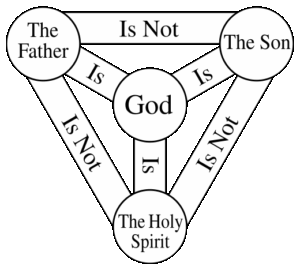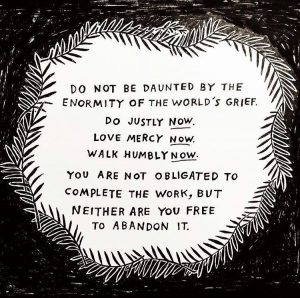From the First Letter to the Corinthians:
Now there are varieties of gifts, but the same Spirit; and there are varieties of services, but the same Lord; and there are varieties of activities, but it is the same God who activates all of them in everyone. To each is given the manifestation of the Spirit for the common good. To one is given through the Spirit the utterance of wisdom, and to another the utterance of knowledge according to the same Spirit, to another faith by the same Spirit, to another gifts of healing by the one Spirit, to another the working of miracles, to another prophecy, to another the discernment of spirits, to another various kinds of tongues, to another the interpretation of tongues. All these are activated by one and the same Spirit, who allots to each one individually just as the Spirit chooses.
(From the Daily Office Lectionary – 1 Corinthians 12:4-11 (NRSV) – April 2, 2014.)
 The genius of Paul is his holistic approach to understanding the gifts of the Spirit, the talents and skills of human beings. Yes, he says, there are all sorts of talents and skills, but they all come from the same source – God the Spirit – and they are all to be used for the same purpose – building up the community. It is a genius that is lost in the modern world, I’m sorry to say.
The genius of Paul is his holistic approach to understanding the gifts of the Spirit, the talents and skills of human beings. Yes, he says, there are all sorts of talents and skills, but they all come from the same source – God the Spirit – and they are all to be used for the same purpose – building up the community. It is a genius that is lost in the modern world, I’m sorry to say.
I spend some time on social media sites such as Facebook and I see people posting the silliest of comments (including some surprisingly stupid quotations from some otherwise intelligent people) which lay down hard-and-fast, black-and-white assertions about things that are clearly false. For example, on Facebook recently the philosophy Bertrand Russell, famously an atheist, was quoted as saying, “So far as I can remember, there is not one word in the Gospels in praise of intelligence.” I don’t know the accuracy or source of the quotation, but there it is. It’s a ridiculous statement on several levels, not the first of which is that it is clearly inaccurate.
Although Jesus or the gospel writers may never have specifically said or written, “Intelligence of good” or something of that nature, Jesus often praises those who understand his parables, or expresses frustration with those who don’t, which is a way of praising intelligence. Further, to limit the Christian message to the Gospels alone leaves out the greater part of the New Testament, including Paul who (as here) praises wisdom and knowledge as gifts of God.
In any event, the posting of that quotation led to a discussion in which one person asserted that “faith and reason are two entirely different things and have nothing to do with one another.” If the writer had been an atheist, I’d have chalked that up to polemic . . . . but the writer claimed to be a Christian! As a Christian, I would debate that proposition fully; faith and reason are neither different nor separate! I would not be alone, either. The late Pope John Paul II began one of his many encyclicals with these words:
Faith and reason are like two wings on which the human spirit rises to the contemplation of truth; and God has placed in the human heart a desire to know the truth – in a word, to know himself – so that, by knowing and loving God, men and women may also come to the fullness of truth about themselves. (Fides et Ratio, 14 Sept. 1998)
Another participant who self-identified as an American citizen asserted in the conversation that “religion has no place in public politics.” Coming from someone whose country’s foundational document, the Declaration of Independence, asserts “that all men are created equal, that they are endowed by their Creator with certain unalienable Rights, that among these are Life, Liberty and the pursuit of Happiness,” a clearly religious sentiment in a public political document, the participant’s argument was not only ridiculous, it could be considered hypocritical! Religion may have no place in government (the U.S. Constitution’s First Amendment is based on that premise), but that is a different thing from saying it has no place in politics.
I tried to suggest that these black-and-white generalizations were inaccurate and did not help to further rational consideration of Bertrand Russell’s assertion, the quotation which had started the conversation. Unfortunately, the discussion became so heated and counterproductive (what at one time back in the days of email list-serves would have been called a “flame war”) that I discontinued participation. Eventually, the original poster closed the discussion and deleted the entire thread.
Finally, this morning, I read a news report in which the first paragraph asserted: “Religion has never fully accepted the LGBT community. It goes against their doctrine, which in and of itself is an issue.” That’s so broad a generalization as to be laughable. “Religion” encompasses every faith system ever adopted by human beings and there is no common “doctrine” amongst them! Furthermore, as an Episcopalian whose church has elected and ordained gay and lesbian bishops, who works regularly with LGBT colleagues both lay and ordained, and whose denomination has come down squarely in favor of marriage equality, I can point to at least one religion about which this generalization is false.
Would that people who write for publication, who produce “content” for the internet, and who take part in the “flame wars” that erupt in social media could adopt St. Paul’s more holistic approach! Instead, we see the tendency to compartmentalize and separate, to insist on a division of public from private, politics from religion, faith from reason, gay from straight, black from white, this from that, whatever from something else, and on and on and on.
The world, however, isn’t black and white; it’s all sorts of grays and other colors. The world isn’t compartmentalized and neither are human beings. The world and the people in it are a fascinating mix of talents, skills, gifts, abilities, positions, attitudes, beliefs, and opinions that cross our arbitrary lines and divisions, that spill from one compartment to the next. We Christians believe all of this flows from one source and all of it has one purpose, to build up community. When we try to compartmentalize and separate, community suffers.
====================
A request to my readers: I’m trying to build the readership of this blog and I’d very much appreciate your help in doing so. If you find something here that is of value, please share it with others. If you are on Facebook, “like” the posts on your page so others can see them. If you are following me on Twitter, please “retweet” the notices of these meditations. If you have a blog of your own, please include mine in your links (a favor I will gladly reciprocate). Many thanks!
====================
Father Funston is the rector of St. Paul’s Episcopal Church, Medina, Ohio.
 A few weeks ago, as I was looking forward to my annual cover-Rachel’s-vacation gig here at Harcourt Parish, my plan was to preach a sort of two-part sermon on play and playfulness. Seemed like a good summer-time thing to do. Last week, on Pentecost Sunday, I suggested to you that playfulness is a gift of the Holy Spirit, that play is why we were made. Today being Trinity Sunday, I planned to follow-up with a few words about how a metaphor of play and playfulness can help us understand and participate in the relational community which the triune God is.
A few weeks ago, as I was looking forward to my annual cover-Rachel’s-vacation gig here at Harcourt Parish, my plan was to preach a sort of two-part sermon on play and playfulness. Seemed like a good summer-time thing to do. Last week, on Pentecost Sunday, I suggested to you that playfulness is a gift of the Holy Spirit, that play is why we were made. Today being Trinity Sunday, I planned to follow-up with a few words about how a metaphor of play and playfulness can help us understand and participate in the relational community which the triune God is.  Lenten Journal, Day 26
Lenten Journal, Day 26 What do you suppose it was like in Jerusalem on that Pentecost morning so long ago?
What do you suppose it was like in Jerusalem on that Pentecost morning so long ago? The genius of Paul is his holistic approach to understanding the gifts of the Spirit, the talents and skills of human beings. Yes, he says, there are all sorts of talents and skills, but they all come from the same source – God the Spirit – and they are all to be used for the same purpose – building up the community. It is a genius that is lost in the modern world, I’m sorry to say.
The genius of Paul is his holistic approach to understanding the gifts of the Spirit, the talents and skills of human beings. Yes, he says, there are all sorts of talents and skills, but they all come from the same source – God the Spirit – and they are all to be used for the same purpose – building up the community. It is a genius that is lost in the modern world, I’m sorry to say.  There are times when I’m reading one or another of the Gospels and I am pulled up short; I just have stop and say, “Really? Jesus said that? Really?”
There are times when I’m reading one or another of the Gospels and I am pulled up short; I just have stop and say, “Really? Jesus said that? Really?” 




